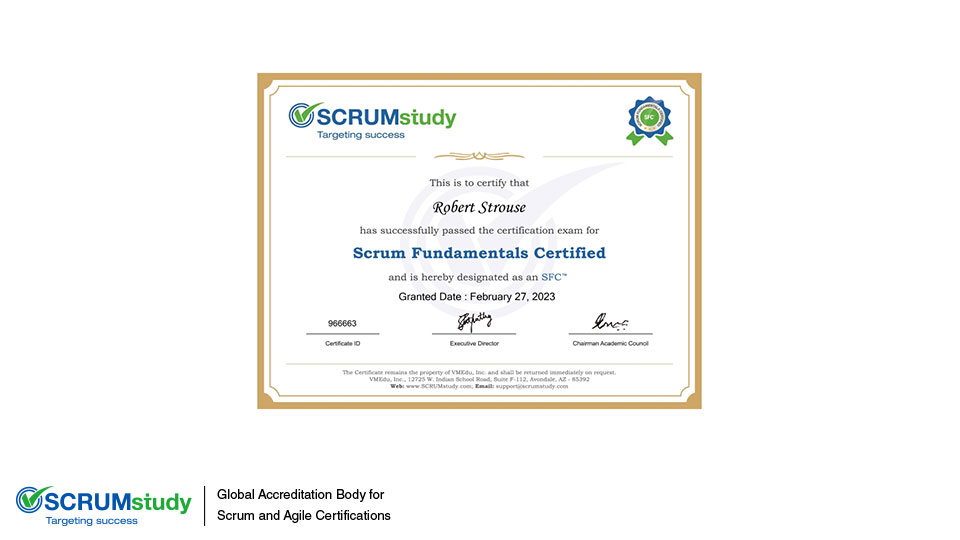Can you explain the roles and responsibilities of a Scrum Master, Product Owner, and Development Team in Scrum?
Posted by SCRUMstudy® on June 29, 2024
Categories: Agile Agile Frameworks Certification Iterative Development SBOK® Guide Scrum Scrum Guide Scrum Principles Scrum Processes Training
The Agile certification exam serves as a benchmark for assessing an individual's understanding and application of Agile principles and practices. The exam evaluates candidates on key concepts such as Scrum roles, events, artifacts, and the importance of iterative development. It emphasizes real-world application, encouraging test-takers to demonstrate not only theoretical knowledge but also practical insights into Agile methodologies. Achieving certification signifies a commitment to continuous improvement and effective collaboration within Agile teams, positioning professionals to contribute meaningfully to their organizations' Agile transformations.
Benefits of SFC™ Certification
-
Foundational Knowledge: The SFC™ certification provides a free pathway for people who are looking to understand the basics of Scrum. With SFC, students get to learn the basics first for better advancement in Agile Project Management.
-
Free Webinar: Enroll today in a Free Scrum Fundamentals Certified Webinar and get a free certificate.
-
Industry Recognition: The knowledge gained by getting a SCRUMstudy™ Scrum Fundamentals Certified certification is universal in its application and has been applied by organizations in diverse projects spanning an eclectic mix of industries.
How to get SFC Certification
To become a Scrum Fundamentals Certified (SFC™) certification, individuals must enroll in the free webinar either from the SCRUMstudy website or SCRUMstudy's authorized training partners or self-study using SCRUMstudy's resources. The certification exam consists of 40 multiple-choice questions based on the Scrum Body of Knowledge (SBOK® Guide), requiring candidates to demonstrate their understanding of Scrum principles and their practical application in various scenarios. Upon successful completion of the exam, candidates receive their SFC™ certification, marking the beginning of their journey towards mastering Scrum.
What are the primary roles and responsibilities of a Scrum Master within a Scrum team?
Posted by SCRUMstudy® on June 28, 2024
Categories: Agile Certification SBOK® Guide Scrum Scrum Guide Scrum Master Training
The Scrum Master plays a crucial role in a Scrum team by facilitating the adoption and implementation of Scrum practices. Their primary responsibilities include serving as a servant leader who helps the team adhere to Scrum principles, ensuring that the Scrum framework is correctly followed. They act as a coach, guiding the team to improve their processes and interactions while removing any obstacles that might impede their progress. The Scrum Master also collaborates with the Product Owner to ensure that the product backlog is well-defined and prioritized. Additionally, they work to foster a collaborative and self-organizing team environment, promoting continuous improvement and resolving conflicts that may arise. Overall, the Scrum Master is essential in helping the team deliver high-quality results efficiently and effectively.
Earning a Scrum Master Certification offers a multitude of benefits. Firstly, it provides a comprehensive understanding of the Scrum framework, including its principles, roles, and practices, enabling professionals to effectively facilitate Scrum processes within their organizations. Additionally, certification validates one's expertise in Agile methodologies, enhancing career prospects and opening doors to diverse job opportunities across various industries. Moreover, becoming a certified Scrum Master demonstrates a commitment to continuous learning and professional development, positioning individuals as valuable assets to their teams and organizations. Overall, the Scrum Master certification exam benefits professionals by equipping them with the knowledge and skills needed to drive successful Agile transformations and deliver value to stakeholders.
We will attempt to do a quick overview of some of the Scrum certifications that are currently being offered.
Next, let's discuss how to choose the right Scrum trainer. While it can be beneficial to find a Scrum trainer with a similar background to yours, it is not an absolute requirement. The framework and style of Scrum training can vary from trainer to trainer, so it's important to find one that matches your learning style.
The biggest positive of a formal Scrum training is that you learn everything in a controlled environment. You meet people who are also there to learn about Scrum and in case you have common background, it helps to understand the process and difficulties of implementation from outsider’s point of view. A formal training also helps you understand about the mistake which you may make due to the traditional project management concepts rooted in you.
The main purpose of any certification is to impart a common baseline of the knowledge. These Scrum certifications, compared to any other project management certifications have a very easy test. You should remember that getting a Scrum certificate is way easier than the implementing actual Scrum framework.
Scrum and Agile methodologies offer significant flexibility in implementation. However, it's crucial to maintain the core principles of the process. Project managers who modify essential elements of Scrum are often referred to as "Scrumbut." It is generally recommended to adopt Scrum in its entirety initially to fully understand its mechanics. Once you have a solid grasp of the framework, you can then make informed decisions about potential adjustments. Over time, you may realize that no changes are necessary.
You need to understand that nothing is more valuable than experience. Scrum or Agile Certification may only add some credibility and marketability to the individual.

